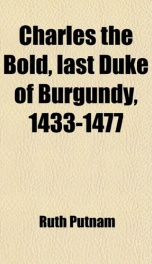Charles the Bold

Purchase of this book includes free trial access to www.million-books.com where you can read more than a million books for free. This is an OCR edition with typos. Excerpt from book: CHAPTER III THE FEAST OF THE PHEASANT 1454 AFTER the fatigues of this contest with Ghent, followed a period of relaxation for the Bur- gundian nobles at Lille, where a notable round of gay festivities was enjoyed by the court. Adolph of Cleves inaugurated the series with an entertainment where, among other things, he delighted his friends by a representation of the tale of the miraculous swan,1 famous in the annals of his house for bringing the opportune knight down the Rhine to wed the forlorn heiress. When his satisfied guests took their leave, Adolph placed a chaplet on the head of one of the gentlemen, thus designating him to devise a new amusement for the company; and under the invitation lurked a tacit challenge to make the coming occasion more brilliant than the first. Again and again was this process repeated. Entertainment followed entertainment, all a mixture of repasts and vaudeville shows in whose preparation the successive hosts vied with each other to attain perfection. The hard times, the stress of ready money, so eloquently painted when the merchants were implored to take pity on their poverty-stricken lord, were cast into utter oblivion. It was harvest tide for skilled craftsmen and artisans. Any one blessed with a clever or fantastic idea easily found a market for the product of his brain. He could see his poetic or quaint conception presented to an applauding public with a wealth of paraphernalia that a modern stage manager would not scorn. How much the nobles spent can only be inferred from the ducal accounts, which are eloquent with information about the creators of all this mimic pomp. About six sous a day was the wage earned by a painter, while the plumbers received eight. These latter were called upon to coax pliable lead into all sorts of shap...
Info about the book
Author:
Series:
Unknown
ISBN:
3842476035
Rating:
1/5 (40)Your rating:
0/5
Languge:
English
Users who have this book
Users who want this book
What readers are saying
What do you think? Write your own comment on this book!
write a commentGenre
if you like Charles the Bold try:
Other books by this author
Do you want to exchange books? It’s EASY!
Get registered and find other users who want to give their favourite books to good hands!


